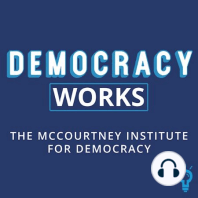35 min listen
The constitutional crisis episode
FromDemocracy Works
ratings:
Length:
24 minutes
Released:
Jul 2, 2018
Format:
Podcast episode
Description
This is one we’ve been wanting to do since we started the podcast. The term constitutional crisis is frequently used but often misunderstood. Like democracy, it’s hard to define but you know it when you see it.If anyone can provide a definition, it’s Jud Mathews, an associate professor of law at Penn State. He has a law degree and a Ph.D. in political science. Jud says we’re not in a constitutional crisis yet, but that constitutional norms — much like democratic norms — are eroding more and more each day.Jud also cautions against using the term constitutional crisis too loosely because of the “boy who cried wolf” problem that we’ll become so desensitized that we won’t recognize one when it actually occurs. Beyond being a legal scholar, he has made the Constitution his life’s work. He’s passionate about what it represents and understandably upset to see its force as a roadmap for the country called into question.If there’s one bright spot to take from this conversation, it’s that there are many dedicated public servants throughout the government who are committed to upholding constitutional norms and preventing a crisis from occurring.Discussion/Reflection QuestionsDo you think were currently in a constitutional crisis?If so, what role do you think citizens play in solving it?In a situation similar to that described above where one branch ignores the constitutional order of another, how should we go about enforcing the rule of law?Are you concerned that the pace at which current events develops today will prevent us from either identifying a constitutional crisis or being able to handle it when we spot it?What role do you think the rising polarization of politics will have in being able to handle and correct a constitutional crisis if one were to develop?Interview Highlights[3:00] What is a constitutional crisis?Jud: You can think of the constitution as a road map. One way to think about a constitutional crisis is that the government is going off the road or off the rails. Such a situation could be the fault of the public or it could be the fault of the document itself. For example, we might face a situation that the constitution does provide guidance for. Fortunately, this doesn’t happen very much in our system. It is also possible that the constitution does provide clear guidance, but we have a single actor who simply refused to follow this guidance and do what they want.[4:30] Are there examples where we’ve been in such a situation in the past?Jud: I think the biggest example that people would look at would be the secession preceding the Civil War. The constitution doesn’t really tell us what to do when a state wants to leave. This arguably led to a war over this issue. My definition is rather strict. Therefore, I wouldn’t say we’ve face many constitutional crisis type situations. One reason I’m strict on my definition is because of a potential “boy who cried wolf” problem. Here, someone complains of so many false emergencies that no one listens when there is an actual crisis. Another reason for the strict definition is that being in a crisis situation leads to serious uses of force potentially.[7:15] We’ve heard people around the president say that he is above the law. Do you have any thoughts on that?Jud: There is a strong respect within the constitution for the idea that while the president isn’t completely above the law, he is subject to it only through his own actions in executing the law. Under the constitution, the executive is charged with ensuring that the law is effectively carried out. Because of this, there is little the other branches can do to control the executive. While this does not mean that the executive is above the law, it is not the place of another branch, such as congress, to appoint a prosecutor to investigate the executive. Given this level of power, it’s incredibly important that the executive respect the law. To ensure this is done, there are many norms in place to sort of curtail the actions of t
Released:
Jul 2, 2018
Format:
Podcast episode
Titles in the series (100)
Middle America, Part 2: Grassroots organizing and rebooting democracy: Last week, we heard from Salena Zito about the segments of middle America who supported Donald Trump after voting for Barack Obama. This week, we talk with another Pittsburgh resident, Lara Putnam, about a different version of Middle America — the college-educated, middle-aged suburban women who have dusted off the organizing skills honed through decades … Continue reading Middle America, Part 2: Grassroots organizing and rebooting democracy → by Democracy Works
